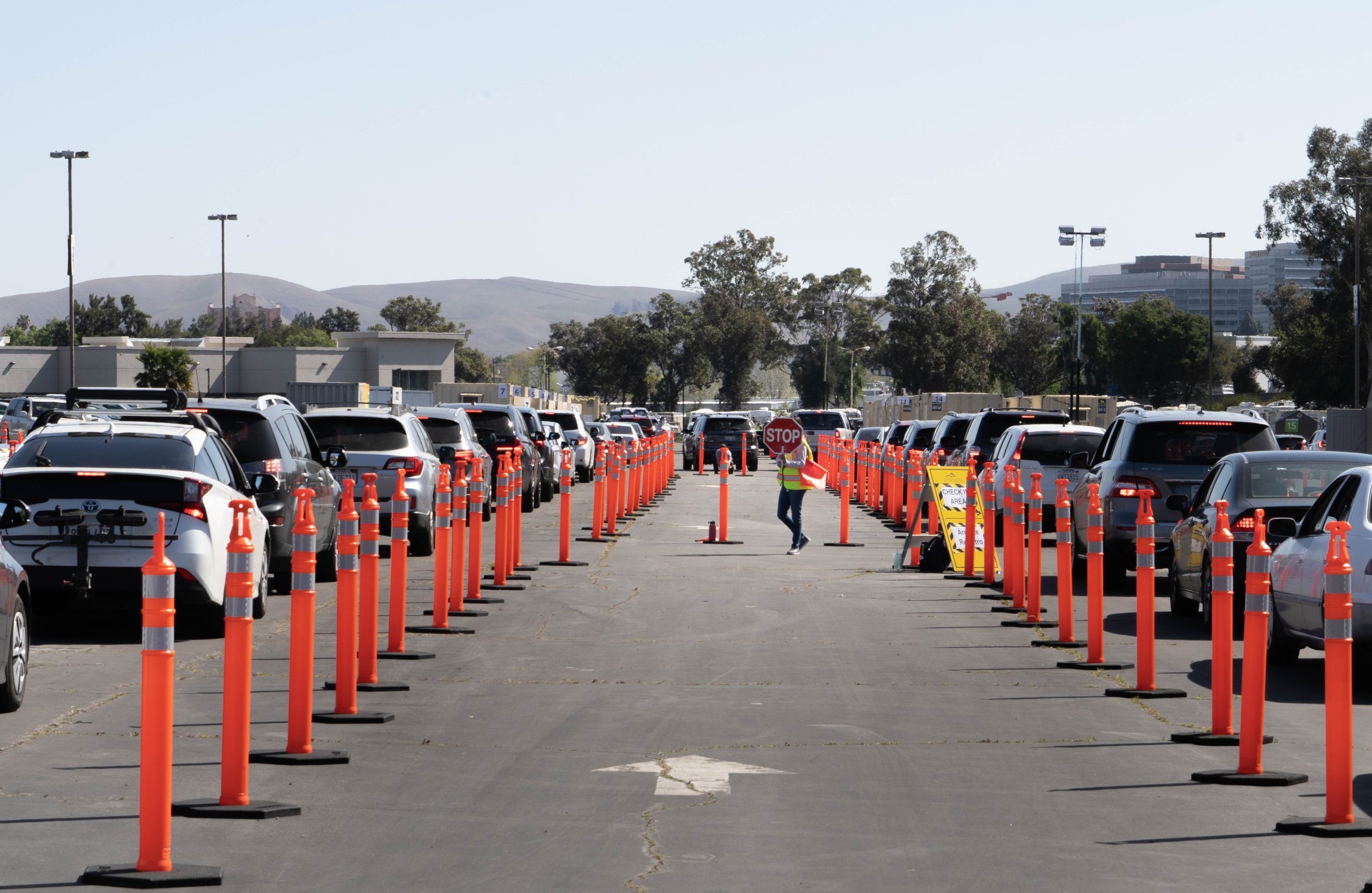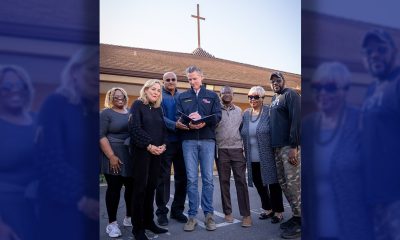Activism
State Employees, Health Care Workers Required To Be Vaccinated Or Tested Regularly For COVID-19
State officials announced July 26 that health care workers and state employees will now be required to get vaccinated against COVID-19 or get tested regularly if they cannot verify their vaccination status.

State officials announced July 26 that health care workers and state employees will now be required to get vaccinated against COVID-19 or get tested regularly if they cannot verify their vaccination status.
The requirement, which officials underscored is not a pure vaccination mandate, will take effect August 2 for state employees and August 9 for a broad range of health care settings and facilities, including outpatient and long-term care facilities.
Those who choose to remain unvaccinated or cannot verify their vaccination status will be encouraged to wear a medical-grade face covering and required to test negative for the virus twice a week if they work in a hospital, or once a week if they work in an outpatient care facility like a dentist’s office.
“Too many people have chosen to live with this virus,” Gov. Gavin Newsom said during a briefing in Oakland to announce the new requirements. “We’re at a point in this pandemic where individuals’ choice not to get vaccinated is now impacting the rest of us in a profound and devastating and deadly way.”
The new requirements are part of the state’s push to get more and more people vaccinated as a wave of new cases, spurred by the ultra-contagious delta variant and cases among unvaccinated people, threatens to halt the state’s progress in mitigating the virus’ spread.
The vast majority of the state’s current cases, hospitalizations and deaths are also among unvaccinated residents, with the number of new cases per day per 100,000 residents around 14 for unvaccinated residents and just two per 100,000 for fully vaccinated people.
The delta variant also accounts for roughly 80% of the current cases that have been analyzed across the state, according to data from the California Health and Human Services Agency.
The California Medical Association endorsed the requirements for health care workers shortly after Newsom’s announcement.
“We’ve come too far to ease up now in our fight against COVID-19,” CMA President Dr. Peter Bretan Jr. Said in a statement. “It makes sense for the health care community to lead the way in requiring vaccines for our employees. We will continue to do all we can to help convince all Californians that vaccines are safe, effective and critical as we come together to bring this pandemic to an end.”
While state and local officials have shied away from outright mandating vaccinations, cracks in that wall have begun to show even as more than 70% of eligible state residents have gotten vaccinated.
Last week, health officials in San Francisco, Contra Costa and Santa Cara counties urged employers of all sizes to consider mandating that their employees get vaccinated, both to protect their co-workers as well as their customers.
On July 26, the U.S. Department of Veterans Affairs became the first federal agency to require that its health care workers get vaccinated in the coming weeks, lest they face penalties like increased testing and potential removal.
University of California, San Francisco, Department of Medicine chair Dr. Bob Wachter noted in a Twitter post that the country appears at a tipping point for vaccination requirements.
“As each organization and industry finds the courage to mandate or strongly incentivize vaccination, it makes it that much easier for the next one to do so,” Wachter said. “Until the pressure is on leaders who have not done it.”
Newsom and California Health and Human Services Secretary Dr. Mark Ghaly noted that first-dose vaccinations increased 16% last week over the previous week, but argued that that pace must be maintained to keep the virus at bay.
Public health officials have also cautioned that while current data has found that fully vaccinated people are well protected against serious illness and death if they contract the delta variant, a future variant may find it much easier to circumvent the available vaccines.
“The fewer people that are vaccinated, the more likely we could have more variants like this delta variant,” State Sen. Nancy Skinner, D-Oakland, said at the July 26 briefing. “Right now we’re seeing that it is not very harmful to a vaccinated person, but how do we know what the next variant is going to be like?”
In recent weeks, Newsom has hinted at the relationship between online misinformation and the remaining vaccination holdouts, but offered his strongest rebuke Monday, equating not getting vaccinated to drunken driving.
“You’re putting other peoples’, innocent peoples’ lives at risk, you’re putting businesses at risk, you’re putting at risk the ability to educate our kids by getting them back in person full-time,” he said, adding that public officials need to be clearer about the societal costs of the pandemic continuing to flourish among the unvaccinated.
State officials said they expect health care settings to be fully in compliance with the new requirements by August 23, giving unvaccinated employees time to get fully vaccinated with either the one- or two-dose vaccine regimen.
Newsom, when asked whether the state will issue additional mask and vaccination mandates, said he hopes the private sector will take those steps before the virus forces the state’s hand.
Even so, the governor reiterated his frequent argument that such mandates will likely be unnecessary – as long as those who are eligible get vaccinated.
“We can extinguish this disease,” Newsom said. “You won’t be asking about mask mandates, that’s the wrong question. The question is, why haven’t we followed the science and why aren’t we finishing the job?”
Activism
Gov. Newsom Approves $170 Million to Fast Track Wildfire Resilience
AB 100 approves major investments in regional conservancies across the state, including over $30 million each for the Sierra Nevada, Santa Monica Mountains, State Coastal, and San Gabriel/Lower LA Rivers and Mountains conservancies. An additional $10 million will support wildfire response and resilience efforts.

By Bo Tefu
California Black Media
With wildfire season approaching, last week Gov. Gavin Newsom signed Assembly Bill (AB) 100, unlocking $170 million to fast-track wildfire prevention and forest management projects — many of which directly protect communities of color, who are often hardest hit by climate-driven disasters.
“With this latest round of funding, we’re continuing to increase the speed and size of forest and vegetation management essential to protecting communities,” said Newsom when he announced the funding on April 14.
“We are leaving no stone unturned — including cutting red tape — in our mission to ensure our neighborhoods are protected from destructive wildfires,” he said.
AB 100 approves major investments in regional conservancies across the state, including over $30 million each for the Sierra Nevada, Santa Monica Mountains, State Coastal, and San Gabriel/Lower LA Rivers and Mountains conservancies. An additional $10 million will support wildfire response and resilience efforts.
Newsom also signed an executive order suspending certain regulations to allow urgent work to move forward faster.
This funding builds on California’s broader Wildfire and Forest Resilience Action Plan, a $2.7 billion effort to reduce fuel loads, increase prescribed burning, and harden communities. The state has also launched new dashboards to keep the public informed and hold agencies accountable.
California has also committed to continue investing $200 million annually through 2028 to expand this effort, ensuring long-term resilience, particularly in vulnerable communities.
Activism
California Rideshare Drivers and Supporters Step Up Push to Unionize
Today in California, over 600,000 rideshare drivers want the ability to form or join unions for the sole purpose of collective bargaining or other mutual aid and protection. It’s a right, and recently at the State Capitol, a large number of people, including some rideshare drivers and others working in the gig economy, reaffirmed that they want to exercise it.

By Antonio Ray Harvey
California Black Media
On July 5, 1935, President Franklin D. Roosevelt signed into federal law the National Labor Relations Act (NLRA). Also known as the “Wagner Act,” the law paved the way for employees to have “the right to self-organization, to form, join, or assist labor organizations,” and “to bargain collectively through representatives of their own choosing, according to the legislation’s language.
Today in California, over 600,000 rideshare drivers want the ability to form or join unions for the sole purpose of collective bargaining or other mutual aid and protection. It’s a right, and recently at the State Capitol, a large number of people, including some rideshare drivers and others working in the gig economy, reaffirmed that they want to exercise it.
On April 8, the rideshare drivers held a rally with lawmakers to garner support for Assembly Bill (AB) 1340, the “Transportation Network Company Drivers (TNC) Labor Relations Act.”
Authored by Assemblymembers Buffy Wicks (D-Oakland) and Marc Berman (D-Menlo Park), AB 1340 would allow drivers to create a union and negotiate contracts with industry leaders like Uber and Lyft.
“All work has dignity, and every worker deserves a voice — especially in these uncertain times,” Wicks said at the rally. “AB 1340 empowers drivers with the choice to join a union and negotiate for better wages, benefits, and protections. When workers stand together, they are one of the most powerful forces for justice in California.”
Wicks and Berman were joined by three members of the California Legislative Black Caucus (CLBC): Assemblymembers Tina McKinnor (D-Inglewood), Sade Elhawary (D-Los Angeles), and Isaac Bryan (D-Ladera Heights).
Yvonne Wheeler, president of the Los Angeles County Federation of Labor; April Verrett, President of Service Employees International Union (SEIU); Tia Orr, Executive Director of SEIU; and a host of others participated in the demonstration on the grounds of the state capitol.
“This is not a gig. This is your life. This is your job,” Bryan said at the rally. “When we organize and fight for our collective needs, it pulls from the people who have so much that they don’t know what to do with it and puts it in the hands of people who are struggling every single day.”
Existing law, the “Protect App-Based Drivers and Services Act,” created by Proposition (Prop) 22, a ballot initiative, categorizes app-based drivers for companies such as Uber and Lyft as independent contractors.
Prop 22 was approved by voters in the November 2020 statewide general election. Since then, Prop 22 has been in court facing challenges from groups trying to overturn it.
However, last July, Prop 22 was upheld by the California Supreme Court last July.
In a 2024, statement after the ruling, Lyft stated that 80% of the rideshare drivers they surveyed acknowledged that Prop 22 “was good for them” and “median hourly earnings of drivers on the Lyft platform in California were 22% higher in 2023 than in 2019.”
Wicks and Berman crafted AB 1340 to circumvent Prop 22.
“With AB 1340, we are putting power in the hands of hundreds of thousands of workers to raise the bar in their industry and create a model for an equitable and innovative partnership in the tech sector,” Berman said.
Activism
California Holds the Line on DEI as Trump Administration Threatens School Funding
The conflict began on Feb. 14, when Craig Trainor, acting assistant secretary for civil rights at the U.S. Department of Education (DOE), issued a “Dear Colleague” letter warning that DEI-related programs in public schools could violate federal civil rights law. The letter, which cited Title VI of the Civil Rights Act and the 2023 Supreme Court ruling in Students for Fair Admissions v. Harvard, which ended race-conscious admissions, ordered schools to eliminate race-based considerations in areas such as admissions, scholarships, hiring, discipline, and student programming.

By Joe W. Bowers Jr
California Black Media
California education leaders are pushing back against the Trump administration’s directive to dismantle diversity, equity, and inclusion (DEI) programs in its K-12 public schools — despite threats to take away billions in federal funding.
The conflict began on Feb. 14, when Craig Trainor, acting assistant secretary for civil rights at the U.S. Department of Education (DOE), issued a “Dear Colleague” letter warning that DEI-related programs in public schools could violate federal civil rights law. The letter, which cited Title VI of the Civil Rights Act and the 2023 Supreme Court ruling in Students for Fair Admissions v. Harvard, which ended race-conscious admissions, ordered schools to eliminate race-based considerations in areas such as admissions, scholarships, hiring, discipline, and student programming.
According to Trainor, “DEI programs discriminate against one group of Americans to favor another.”
On April 3, the DOE escalated the pressure, sending a follow-up letter to states demanding that every local educational agency (LEA) certify — within 10 business days — that they were not using federal funds to support “illegal DEI.” The certification requirement, tied to continued federal aid, raised the stakes for California, which receives more than $16 billion annually in federal education funding.
So far, California has refused to comply with the DOE order.
“There is nothing in state or federal law that outlaws the broad concepts of ‘diversity,’ ‘equity,’ or ‘inclusion,’” wrote David Schapira, California’s Chief Deputy Superintendent of Public Instruction, in an April 4 letter to superintendents and charter school administrators. Schapira noted that all of California’s more than 1,000 traditional public school districts submit Title VI compliance assurances annually and are subject to regular oversight by the state and the federal government.
In a formal response to the DOE on April 11, the California Department of Education, the State Board of Education, and State Superintendent of Public Instruction Tony Thurmond collectively rejected the certification demand, calling it vague, legally unsupported, and procedurally improper.
“California and its nearly 2,000 LEAs (including traditional public schools and charter schools) have already provided the requisite guarantee that its programs and services are, and will be, in compliance with Title VI and its implementing regulation,” the letter says.
Thurmond added in a statement, “Today, California affirmed existing and continued compliance with federal laws while we stay the course to move the needle for all students. As our responses to the United States Department of Education state and as the plain text of state and federal laws affirm, there is nothing unlawful about broad core values such as diversity, equity and inclusion. I am proud of our students, educators and school communities who continue to focus on teaching and learning, despite federal actions intended to distract and disrupt.”
California officials say that the federal government cannot change existing civil rights enforcement standards without going through formal rule-making procedures, which require public notice and comment.
Other states are taking a similar approach. In a letter to the DOE, Daniel Morton-Bentley, deputy commissioner and counsel for the New York State Education Department, wrote, “We understand that the current administration seeks to censor anything it deems ‘diversity, equity & inclusion.’ But there are no federal or State laws prohibiting the principles of DEI.”
-

 Activism4 weeks ago
Activism4 weeks agoOakland Post Endorses Barbara Lee
-

 Activism4 weeks ago
Activism4 weeks agoOakland Post: Week of April 2 – 8, 2025
-

 #NNPA BlackPress3 weeks ago
#NNPA BlackPress3 weeks agoTrump Profits, Black America Pays the Price
-

 Activism2 weeks ago
Activism2 weeks agoOakland Post: Week of April 9 – 15, 2025
-

 #NNPA BlackPress3 weeks ago
#NNPA BlackPress3 weeks agoHarriet Tubman Scrubbed; DEI Dismantled
-

 #NNPA BlackPress3 weeks ago
#NNPA BlackPress3 weeks agoTrump Targets a Slavery Removal from the National Museum of African-American History and Culture
-

 #NNPA BlackPress3 weeks ago
#NNPA BlackPress3 weeks agoNew York Stands Firm Against Trump Administration’s Order to Abandon Diversity in Schools
-

 #NNPA BlackPress3 weeks ago
#NNPA BlackPress3 weeks agoLawmakers Greenlight Reparations Study for Descendants of Enslaved Marylanders





















































